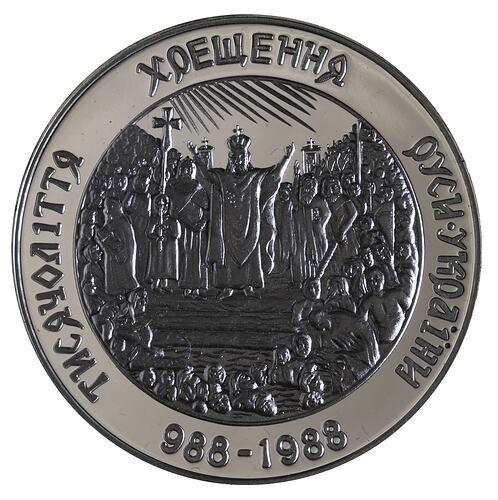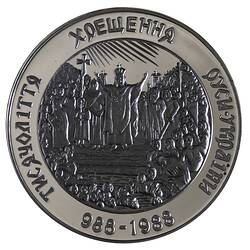Volodymyr the Great (Valdamar, Volodimer, Vladimir) was a pagan Ukrainian prince who converted to Christianity. His conversion was politically useful, enabling him to create an alliance with Byzantine emperor Basil II.
Volodymyr was born around 956 AD. From a privileged background, he was the son of Sviatoslav I Ihorevych and Malusha. In 969, at the age of 13, his father named him Volodymyr the Great, prince of Novgorod. Volodymyr ruled under the guidance of his uncle, Dobrynia.
Eight years later, in 977, Sviatoslav's sons began to struggle for power. Yaropolk I, then the grand prince of Kyiv, seized the the city of Novgorod and the Derevlianian land, forcing Volodymyr to flee. Volodymyr sought refuge in Scandanavia. Three years later, Volodymyr returned with a Varangian (Slavic Viking) force, expelled Yaropolk's governors from Novgorod and took Polatsk after a battle in which Prince Rogvolod of Polatsk was slain. Volodymyr took Rogvolod's daughter, Rohnida, as his wife, then went on to capture Kyiv and have Yaropolk murdered, thereby becoming the grand prince. He then married Yaropolk's Greek widow. Volodymyr eventually fathered 11 princes by five wives. Volodymyr attributed his victory to the support of pagan forces, and he arranged for idols of the deities to be set up on a hill overlooking his palace in Kyiv.
Over the next 35 years Volodymyr expanded the area of Kyivan Rus' and created a powerful Eastern European state. In 983 his war against the Yatvingians gave him access to the Baltic Sea; two years later he fought the Khazars and Volga Bulgars and secured his eastern frontier; and he actively defended his southern borders. He united the remaining East Slavic tribes and installed his sons or viceroys to govern his realms, dispense justice and collect tax.
Over time, Volodymyr noticed that the monotheistic religions of Christianity and Islam had benefited his neighboring rulers. When the Byzantine emperor Basil II turned to him for help in defeating his rival, Bardas Phocas, Volodymyr saw an opportunity. He offered military aid on condition of being able to marry Basil's sister, Anna, and agreed to convert himself and his subjects to Christianity. Volodymyr was baptized in December 987, taking the Christian name Vasylii (Basil). Soon he ordered the destruction of all pagan idols, and a mass baptism of the citizens of Kyiv took place on 1 August 988. Conversion of the remaining population of Rus' occured slowly, although more rapidly where force was exerted. Missionaries aided the process, as did cultural change with the spread of Byzantine art, education and literature. The first schools and churches were built, including the Church of the Tithes in Kyiv. The adoption of Christianity as the official religion also further unified the Rus' tribes and facilitated neighbouring relations, particularly with the Byzantine Empire, Bulgaria and Germany. Volodymyr received several papal emissaries and sent his own envoys to Rome.
Toward the end of his life Volodymyr's sons, Sviatopolk I of Turiv and Yaroslav the Wise of Novgorod, challenged his rule. Rising to the challenge, Volodymyr defeated Sviatopolk before dying near Kyiv on 15 July 1015 aged about 57, , while preparing a campaign against another son, Yaroslav. He was buried in the Church of the Tithes, and was succeeded briefly by Sviatopolk.
The Rus' clergy venerated Volodymyr for his contribution to the church. He was canonized after 1240 and thereafter referred to as 'the holy, equal to the Apostles, grand prince of Kyiv.' His feast day, 28 July (15 July OS), was first celebrated in 1263.
References:
Encyclopaedia of Ukraine website http://www.encyclopediaofukraine.com/pages/V/O/VolodymyrtheGreat.htm, accessed 16/2/2004 and 3/11/2010.
More Information
-
Keywords
-
Localities
-
Authors
-
Article types

